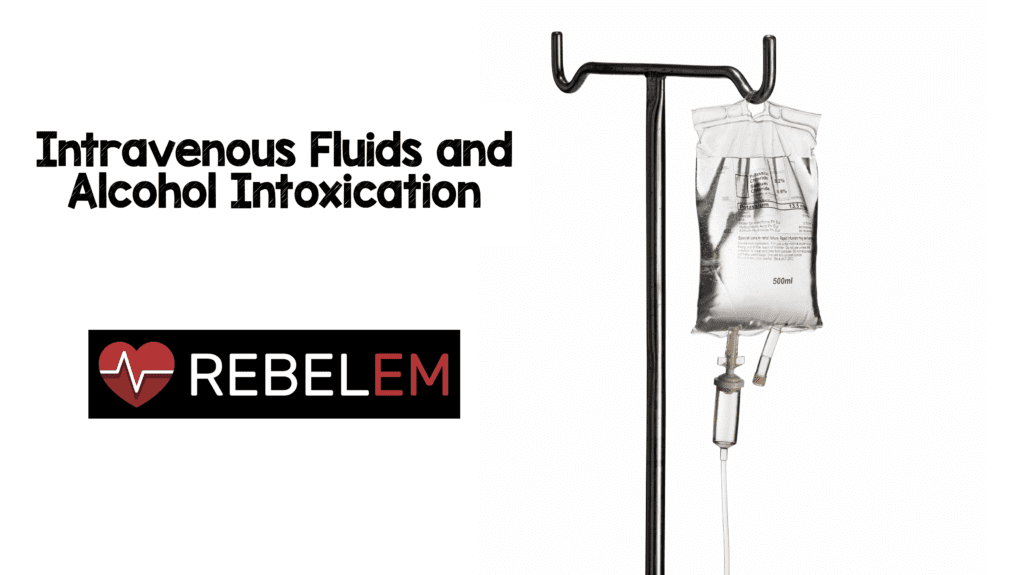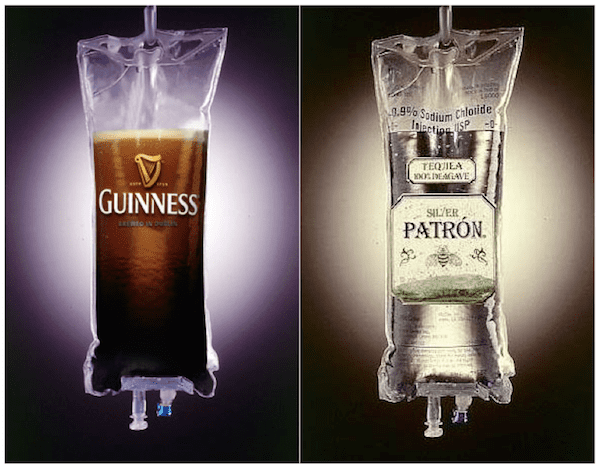 Frequently, patients with acute alcohol intoxication are brought to the emergency department (ED) for evaluation and treatment. Although practice patterns vary, it is not an uncommon practice to give normal saline to these patients in the hopes that the saline will cause a dilution effect on the level of alcohol helping patients sober faster and therefore having a shorter length of stay in the ED. At the end of 2013 a study was published evaluating intravenous fluids and alcohol intoxication.
Frequently, patients with acute alcohol intoxication are brought to the emergency department (ED) for evaluation and treatment. Although practice patterns vary, it is not an uncommon practice to give normal saline to these patients in the hopes that the saline will cause a dilution effect on the level of alcohol helping patients sober faster and therefore having a shorter length of stay in the ED. At the end of 2013 a study was published evaluating intravenous fluids and alcohol intoxication.
How often do physicians use intravenous fluids in alcohol intoxication? [1] [2]
- 73 – 87% of US emergency medicine physicians use intravenous fluids to treat alcohol intoxication
Are there any studies looking at the benefit of intravenous fluids and alcohol intoxication? [2][3]

Table Modified from Best BETs
What is the most recent study evaluating the benefit of intravenous fluids and alcohol intoxication? [4]
What they did:
- Single-blind, randomized controlled trial of 144 uncomplicated acutely intoxicated ED patients aged 18 – 50 years of age
- Carried out in 2 EDs in Queensland, Australia
- Single bolus of 20mL/kg intravenous 0.9% saline + observation vs observation alone
- Uncomplicated patients = no injuries, overdose, or psychiatric conditions requiring ongoing treatment
Primary Outcomes:
- ED Length of Stay (EDLOS) = Triage time to actual discharge time
Secondary Outcomes:
- Treatment Time = Time from being assessed by a treating doctor or nurse, until the time patient deemed ready for discharge
- Breath Alcohol Levels
- Intoxication Symptom Score
- Level of Intoxication
- Associated Healthcare Costs
Results:
- Baseline blood alcohol content (BAC) in two groups: 0.2% vs 0.19%
- Baseline Intoxication Symptoms Scores: 22.0 vs 22.3
- EDLOS: 287 vs 274 minutes (p value = 0.89)
- Treatment Time: 244 vs 232 minutes (p value = 0.94)
- Absolute Difference in Breath Alcohol Level at 2 Hours: -0.036 vs -0.013 (p value = 0.16)
- Intoxication Score and Level of Intoxication were not significantly different between the two groups
- Cost Savings $156.44 in the intravenous fluids group and $124.52 in the observation group resulting in a net $31.92 saved per patient with no intravenous fluids
Limitations:
- No placebo in the observation group
- Staff and patients not blinded
- When ED volume was high, many intoxicated patients were not enrolled into study (i.e. 82 patients)
- Not powered for secondary outcomes (i.e. Although the absolute breath alcohol level was decreased at 2 hours, because of the small numbers enrolled in this study…not statistically significant)
Conclusion: Intravenous normal saline plus observation does not decrease ED length of stay compared with observation alone in uncomplicated, alcohol intoxicated patients

Take Home Message
There is no evidence that intravenous fluids will expedite sobriety in patients with acute alcohol intoxication
References:
- Hindmarch PN et al. Emergency Physicians’ Opinions on the Use of Intravenous fluids to Treat Patients Intoxicated with Ethanol (Alcohol): Attitudes of Emergency Medicine Physicians in the North East of England Toward the use of Intravenous fluids to Treat Individuals Intoxicated with Ethanol (Alcohol) Attending the emergency Department Compared with the Scientific Evidence. Our J Emerg Med 2012. PMID: 22134421
- Li J et al. Intravenous Saline has no Effect on Blood Ethanol Clearance. J Emerg Med 1999. PMID: 9950378
- Gershman H et al. Rate of Clearance of Ethanol from the Blood of Intoxicated patients in the emergency Department. J Emerg Med 1991. PMID: 1940231
- Perez SR et al. Intravenous 0.9% Sodium Chloride Therapy Does not Reduce Length of Stay of Alcohol-Intoxicated patients in the Emergency Department: A Randomized Controlled Trial. Emerg Med Australas 2013. PMID: 24308613
- Toups VJ et al. Blood Ethanol Clearance Rates. J Emerg Med 1992. PMID: 1430989
For more thoughts on intravenous fluids and alcohol intoxication also checkout:
- Simon Carley at St. Emlyn’s Blog
- Best BETs



